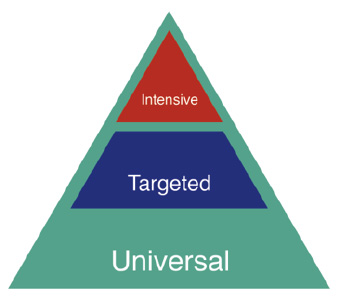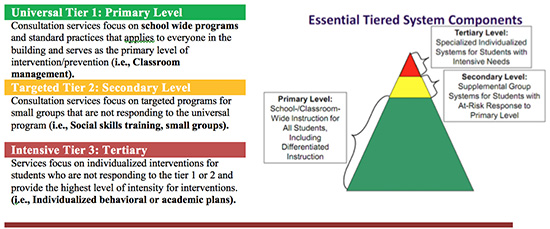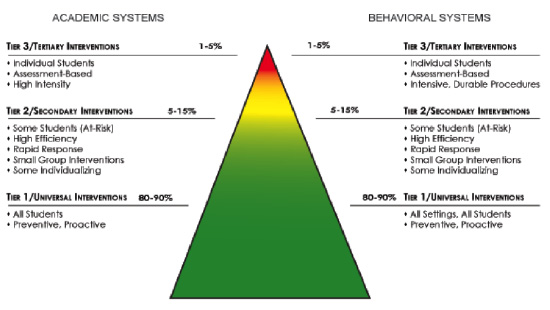Our approach to services at CEPS is based in the behavioral ecological consultation model (Sheridan & Kratochwill, 2007), which is an indirect service delivery model that focuses on supporting and training individuals (parents, teachers, other helping professionals) within the student’s daily context (home, school). This is in contrast with direct service delivery models where professionals provide the intervention directly to the student. The indirect model is used at CEPS as it allows for greater generalization and sustainability of change by addressing the problems a student may face in their natural environment and by building competencies of individuals and organizations in the student’s life to better support their needs.
Behavioral Perspective
The theoretical foundation of CEPS is grounded in the Behavioral Perspective that includes Applied Behavior Analysis (ABA), Positive Behavioral Interventions and Supports (PBIS) and Contextual Behavioral Science (CBS). This behavioral perspective emphasizes the “act in context”, working with students and schools within the immediate and broader context in which they are situated to better address needs, enhancing existing strengths and working in a problem-solving process for continuous improvement.
Analysis of the context in which the child is situated includes looking at the antecedents, the behavior of interest and the consequences of the behavior to develop support plans. This contextual behavioral analysis is further expanded by taking into account learning/developmental histories of the child, current skill levels and evaluating the child’s environment to see how it can be enhanced to better meet the child’s need. For school systems, similar contextual analysis is done to determine what context can be cultivated to best meet the school or classroom’s needs, what was the history of the system and what skills are present in the system currently.
Ecological Systems Theory
In addition to the behavioral perspective, CEPS also incorporates the ecological systems perspective (Bronfenbrenner) to include the focus on systems (family, school, communities) and how they interact to influence the students or the organizations. These multiple overlapping ecological systems are further broken down into multiple levels and include:
- Within Individual System – biological and psychological context of the individual (i.e., genetics, medical conditions, etc.)
- Microsystem – immediate system the child is in (family, schools)
- Mesosystem – interactions among microsystems (home-school interactions)
- Exosystem – systems that the child may not directly interact with but has impacts on microsystems (i.e., parental work stress, school policy)
- Macrosystem – include cultural practices and influences
- Chronosystem – looks at system and development across time

Evidence-Based Practices

As the title of CEPS indicates, we are committed to providing evidence-based practices in schools. Evidence-based practices include three interconnected principles that include Best Research Evidence, Clinical Expertise and Client Values.
Best research evidence is based on scientific evidence at two different levels. At the first level, the practice should be based on evidence that it works from well-controlled experimental studies that demonstrate efficacy and effectiveness. Additionally, the second level of research involves studies that look at the underlying theory or why the practice works.
Clinical Expertise involves the decision making process and opinions of highly trained individuals that have clinical expertise.
Client Values focuses on goals and values of the clients to provide high quality that reflect those values.
Specifically, at CEPS these principles of evidence-based practices incorporate collaboratively working with consultees to develop measurable goals and valued outcomes, individualized assessments, providing explicit training and support for intervention implementation, data-based decision making, and providing on-going monitoring and modification.
Tiered Public Health Model of Services

One increasingly supported evidence-based practice in schools is the tiered public health model of service delivery, that organizes evidence-based practices across multiple overlapping levels. Typically, these include universal practices that apply to everyone, targeted practices that are added to groups that need it and intensive practices for those that are not able to improve from the other two tiers. This model emphasizes the systems approach by looking at all the practices in schools and providing schools with a decision making procedure for how to use their resources and organize services.
Multi-tiered Systems of Support & Interconnected Systems Framework
CEPS is grounded in the framework of Multi-Tiered Systems of Support (MTSS) (increasingly intensive tiers of interventions) and Interconnected Systems Framework (ISF) (linking school, families, communities and other support systems). MTSS is an evidence-based framework for approaching sustainable change in school, which allows for school-wide, class-wide and individualized interventions, based on the level of needs (typically start at school-wide level and progress to more specific interventions if the student does not respond to the broader programs). The ISF initiatives build on MTSS by coordinating across different organizations to better meet the needs of children (i.e., collaboration between teacher and parents or between hospital and school professionals).

MTSS also ranges from academic to behavioral (mental health/social-emotional) concerns, which is typically conceptualized as shown in the diagram below. Academic MTSS is often called Response to Intervention(RTI) even though the term can also be used for behavior. Behavioral MTSS programs include Positive Behavioral Interventions and Supports (PBIS), School Mental Health (SMH), and Social Emotional Learning (SEL).

